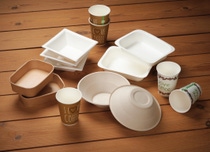Media
New certified home-compostable ecovio® for extrusion coating on paper and board of food packaging
- Food-contact approved ecovio® 70 PS14H6 for paper-based packaging applications like cups, bowls and trays for dairy products, hot or cold drinks, snacks as well as food wrappings
- Performance regarding processing, sealing, printability and paper adhesion on same level as polyethylene
- Home-compostable ecovio® extends end-of-life options for paper packaging
- BASF at interpack 2023, Germany: hall 10, booth 10B43
BASF extends its ecovio® portfolio for extrusion coating on paper and board by adding a certified home as well as industrial compostable grade for cold and hot food packaging. The new extrusion coating grade ecovio® 70 PS14H6 is food-contact approved and shows excellent barrier properties against liquids, fats, grease, and mineral oil as well as temperature stability at boiling water (up to 100°C). It is also characterized by outstanding adhesion to many types of paper and board. It thus enables paper applications like cups and pots for dairy products (also frozen), wrappings for sandwiches and cereal bars, bowls and trays for sweets and snacks as well as to-go cups for hot/cold drinks and soup. After usage, food packaging made of paper coated with ecovio® 70 PS14H6 can be composted either in garden home compost or industrial composting facilities according to national legislation. The new home-compostable biopolymer thus supports organics recycling and helps to close the nutrient loop to achieve a circular economy.
Excellent processability in mono or co-extrusion without adhesives
The new home-compostable grade shows better performance than currently available biopolymers on the market. It allows coating of paper and board packaging for food applications to achieve additional barrier properties by mono or multi-layer extrusion without adhesives. The paper coating can be done with the coating line speed comparable to polyethylene (PE). The material shows no adhesion to chill roll and outstanding sealing and printing properties. It is also possible to achieve coating weights like PE depending on application and equipment so that it can also be used to manufacture very thin coatings.
“By being certified home as well as industrial compostable, our new ecovio® grade extends the end-of-life options for paper-based packaging,” says Michael Bernhard Schick from global marketing Biopolymers at BASF. “There is a big trend in society, in some countries driven by legislation, to move from pure plastic to paper-based packaging, which in itself is not suitable for a lot of different foods, especially with liquid or fatty ingredients. We offer a strong and at the same time sustainable packaging solution for hot, frozen or chilled food, which can stand usage temperatures from -40 bis +100°C. ecovio® 70 PS14H6 thus combines excellent technical performance with the decisive added benefit of home-compostability for paper packaging, supporting organics recycling of food waste.” The new biopolymer is available with a bio-based content between 70-80 percent of renewable resources according to ASTM D 6866. It complements the ecovio® portfolio for paper coating which consists of tailored industrially compostable grades with properties adjusted to different market needs.
BASF’s biopolymers enable organics recycling
BASF’s biopolymer ecovio® is certified compostable in accordance with standards such as DIN EN 13432. It is a blend of BASF’s PBAT ecoflex® and renewable raw materials. Typical applications for ecovio® are organic waste bags, cling film, fruit and vegetable bags, as well as agricultural mulch films and food packaging applications. Studies show the advantages of ecovio® for production, packaging and shelf life of food as well as for the collection of food waste. These advantages are based on the material’s certified biodegradability in industrial and home composting as well as in agricultural soil: Food waste is reduced, nutrients are returned to the soil by means of greater volumes of compost – and the accumulation of persistent microplastic in agricultural soil is avoided. This contributes to a circular economy by closing the nutrient cycle via organics recycling.
Further information: www.ecovio.basf.com and www.biopolymers.basf.com
For more information on BASF at interpack, please visit our website www.basf.com/interpack2023.
About BASF’s Performance Materials division
BASF’s Performance Materials division is at the forefront of the much-needed sustainability transformation in plastics. Our products are co-created with customers around the globe to bring innovations to four major industry sectors – transportation, consumer goods, industrial applications, and construction. Our R&D focuses on all stages of the plastics journey: Make, Use and Recycle. The MAKE phase is about improving how plastics are made, from product design to the choice of raw materials and the manufacturing process itself. The USE phase enhances plastics’ strengths such as light weight, robustness, and thermal resistance. At the end of the product lifecycle, the RECYCLE phase looks at how to close the loop to achieve a circular economy. In 2022, the Performance Materials division achieved global sales of €8.5 billion. Join #ourplasticsjourney at: www.plastics.basf.com
About BASF
At BASF, we create chemistry for a sustainable future. We combine economic success with environmental protection and social responsibility. More than 111,000 employees in the BASF Group contribute to the success of our customers in nearly all sectors and almost every country in the world. Our portfolio comprises six segments: Chemicals, Materials, Industrial Solutions, Surface Technologies, Nutrition & Care and Agricultural Solutions. BASF generated sales of €87.3 billion in 2022. BASF shares are traded on the stock exchange in Frankfurt (BAS) and as American Depositary Receipts (BASFY) in the United States. Further information at www.basf.com.
P-23-197

